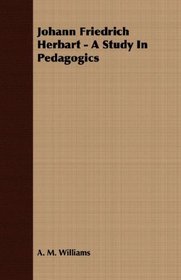Search -
Johann Friedrich Herbart - A Study In Pedagogics
Johann Friedrich Herbart - A Study In Pedagogics
Author:
Preface. The article on Herbart in Reins Enc klap discAes HnndbucA der Padagogiik is supplied with references and a bibliography on a scale by which one can measure the greatness of Herbarts influence. Potent as that now is, it took some time to declare itself. Seventy years have passed since the death of the teacher-philosopher, and his General... more »
Author:
Preface. The article on Herbart in Reins Enc klap discAes HnndbucA der Padagogiik is supplied with references and a bibliography on a scale by which one can measure the greatness of Herbarts influence. Potent as that now is, it took some time to declare itself. Seventy years have passed since the death of the teacher-philosopher, and his General... more »
ISBN-13: 9781408635193
ISBN-10: 1408635194
Publication Date: 2/28/2008
Pages: 128
Rating: ?
ISBN-10: 1408635194
Publication Date: 2/28/2008
Pages: 128
Rating: ?
0 stars, based on 0 rating




